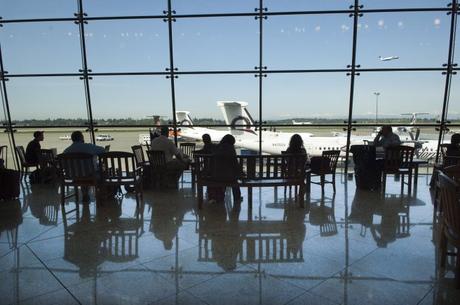
We are sitting in a government office in Suleimaniyah (commonly called Suli) and we are waiting. We left Rania at seven in the morning. The sun had already welcomed the day and a beautiful breeze accompanied us on our walk to the university.
The road between Rania and Suli begins as a one lane, heavily trafficked highway. Even early in the morning cars, trucks, and lorries are moving fast. Traffic in this part of the world is not for the fainthearted. There are few rules and those who observe them are much more likely to get hurt than the rest of us. Until we reach Dukan, a small city beside a winding river, the road is narrow and crowded with little room to pass. At Dukan it widens and becomes much more comfortable for those in the back seat of an old Toyota pickup truck.
We get to the residency office in Suli and this is where the waiting begins. People are scurrying here and there, some of them lawyers or handlers, others are people like us who don't have a clue what they are doing. What we do know is that we need to be here and we need to behave. We are guests in a country and mama always said that guests need to behave. The busy looking people have a lot of paper and a lot of passports in their care, and it matters what they say and what they do with the paper and the passports. They are our go betweens. While we must perfect the art of waiting, they must perfect the art of acting and doing. They understand both the language and the process, and we desperately need them.
Black numbers mark small cubicles where government workers, separated by glass, interview or authoritatively stamp approval or disapproval on official looking papers. This is Kurdistan, so the number of people smiling far exceeds the number who look grumpy. I love this and feel an affinity with Kurds in their generally optimistic outlook on life. They have much to teach the world about waiting and about hope.
There is a lot of waiting in this building. My colleague makes the insightful observation that knowing you are waiting for something automatically changes the quality of time you have. If I suddenly had this long stretch of time at home, I would be delighted. There would be so many things I could do and so much possibility created by knowing I have extra time. Not so when I am forced to wait. Suddenly I feel paralyzed and can't do anything.
Just before we left Massachusetts we ended up at the Division of Motor Vehicles, non-affectionately called the DMV by those in the know. The line for the DMV went out the door and down the hallway to a nearby Target store. It was a nightmare. In any country, in any language, government bureaucracy looks similar. What changes is whether you know what's going on or not, otherwise the lack of ability to control what goes on is exactly the same. And world-wide the approach is similar with these four rules:
- Be as nice as possible without seeming like you are trying to butter your way onto the bureaucracy toast
- Have just the appropriate degree of assertiveness
- Say please and thank you
- Whenever possible make people smile.
In any country and in any language there is another universal truth: the truth of waiting. Waiting. Suspended between. Not sure when you'll be able to leave or if you will leave with what you came for.
We wait. Always we wait. It's a universal experience, one that will not be over until our final breath. Airport terminals, hospitals, and government office buildings are just a few of the spaces where we live in the limbo of the "not yet arrived."
Sometimes we wait patiently and other times we are impatient. Sometimes we wait with a good sense of humor while other times we are grumpy. Sometimes we wait with anticipation and other times we wait with dread.
While I am waiting for a residency permit, you may be suspended between a blood test and a diagnosis; a job interview and a job offer; a visa application and a stamp of approval; a pregnancy test and a definitive little pink line; an abnormal mammogram and a biopsy; an offer on a house and an acceptance of the offer; a child who is far away and their homecoming; a journey or question of faith and an answer.
May you know the song of the waiting one. May you be able to rest despite your nerves and your tears; may you be able to trust against the odds; may your imagination be enfolded in grace; may your heart rest in the knowledge that in all the waiting, there is one who waits with you.
May you know grace and peace in the margins of waiting. "Above all, we wait for God. We move forward in faith, only to be stopped in transit. So we wait. It's not time. We sit tight. There are dozens of ways that God moves in an orchestrates our plans, our movements. We may never know the reason for the waiting - they may elude us until the day we die and we're on the other side of eternity."For waiting is nothing new to the work of God.
"And so I wait [in a government building], thinking of this God who reaches through time and place and asks us to be okay in the in-between, to trust his character and his love. Giving thanks to a God who is utterly trustworthy and completely unpredictable, a God who knows all about waiting as he daily waits for his children to finally get it." from "Mumbai Airport" in Between Worlds: Essays on Culture and Belonging

